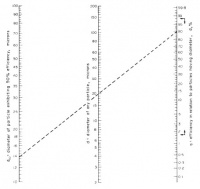Difference between revisions of "Cyclone"
Agus.nuryadi (talk | contribs) (→Literature Perhitungan Dasar cyclone) |
Agus.nuryadi (talk | contribs) (→basic calculation cyclone) |
||
| Line 2: | Line 2: | ||
The nomographs by Zanker can be used to make a preliminary estimate of the size of cyclone needed. The specialist manufacturers of hydrocyclone equipment should be consulted to determine the best arrangements and design for a particular application. Zanker’s method is outlined below and illustrated in the Example below and based on an empirical equation by Bradley (1960): | The nomographs by Zanker can be used to make a preliminary estimate of the size of cyclone needed. The specialist manufacturers of hydrocyclone equipment should be consulted to determine the best arrangements and design for a particular application. Zanker’s method is outlined below and illustrated in the Example below and based on an empirical equation by Bradley (1960): | ||
| + | |||
| + | [[File:rumusA.jpg|200px|thumb|centre|alt text]] | ||
| + | |||
| + | '''d50''' = the particle diameter for which the cyclone is 50 per cent efficient, '''Micron''' | ||
| + | '''Dc''' = diameter of the cyclone chamber, '''cm,''' | ||
| + | |||
| + | [[File:rumusB.jpg|200px|thumb|centre|alt text]] | ||
| + | |||
| + | Determination of d50 from the desired particle separation | ||
Revision as of 16:01, 25 November 2020
basic calculation cyclone
The nomographs by Zanker can be used to make a preliminary estimate of the size of cyclone needed. The specialist manufacturers of hydrocyclone equipment should be consulted to determine the best arrangements and design for a particular application. Zanker’s method is outlined below and illustrated in the Example below and based on an empirical equation by Bradley (1960):
d50 = the particle diameter for which the cyclone is 50 per cent efficient, Micron Dc = diameter of the cyclone chamber, cm,
Determination of d50 from the desired particle separation

